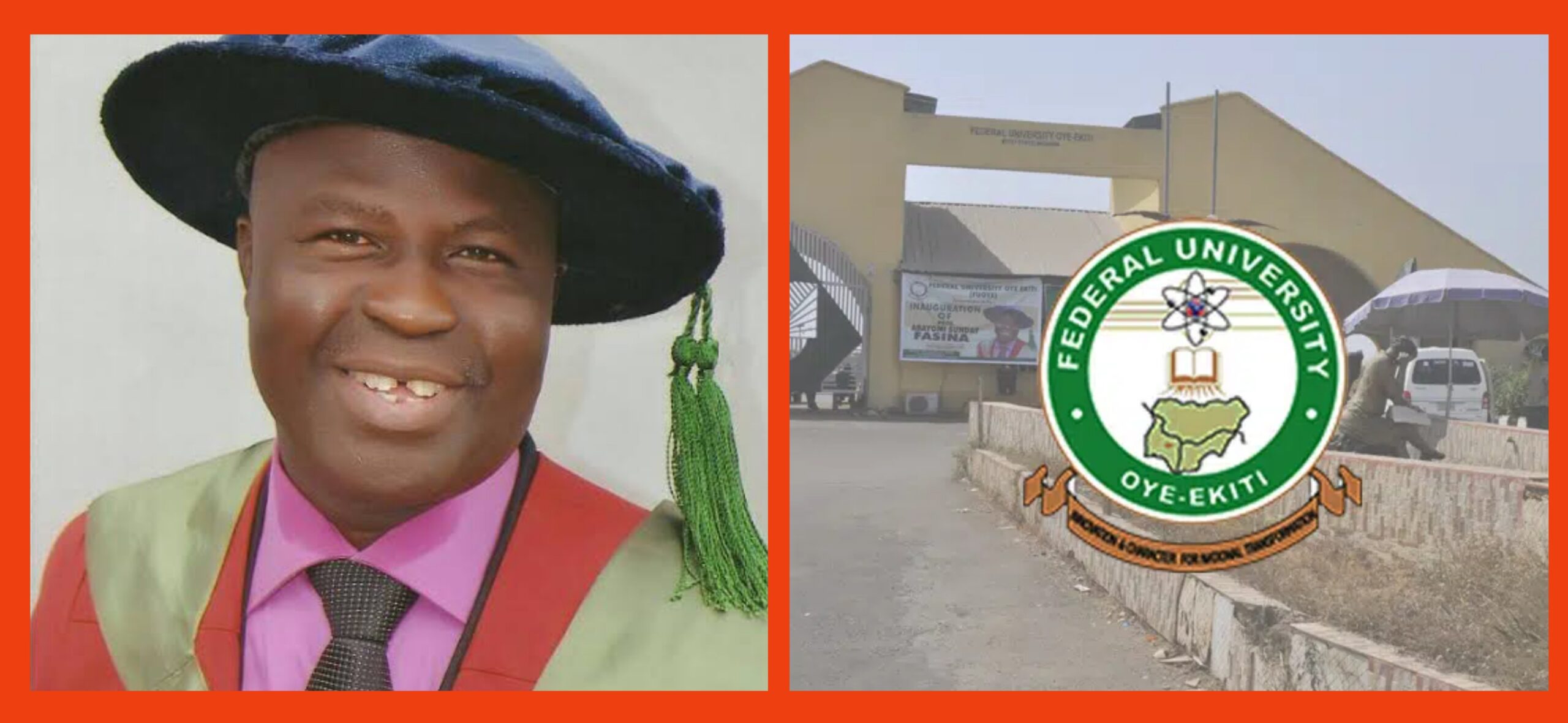By Wahab B. M and Olugbemi-Gabriel O.
Assumption destroys like an atomic bomb and when the capacity of assumption is assessed from a security point of view, it is unarguably a weapon of mass destruction. Closely related is Josef Goebbels’s principle of propaganda, which states eerily that: “if you tell a lie big enough repeatedly, people will eventually come to believe it”. Simply put, when a lie is told many times and left unchallenged, it becomes the truth.
In the same vein, a well-orchestrated assumption has the capacity to infect many people wittingly and unwittingly, and oftentimes, pushes them to go on an onslaught. These time-tested tactics and predilection are evidently at the core of the motive behind a pamphlet titled: “Nigeria and Its Criminal Justice System” written, published and widely circulated by Dele Farotimi (DF), a lawyer and political activist. Unsurprisingly, the pamphlet has become a sensation, controversial and deeply polarizing subject within and outside Nigeria. Mindful of the legendary gullibility of Nigerians and taking advantage of the ubiquitous social media hordes and mob, the writer offers a salacious meal of fiction, falsehood, and faction over which his die-hard followers are picking their teeth.
However, thrown into the mix is the reputation of one of Nigeria’s greatest living lawyer, Afe Babalola, who is accused of corrupting the temple of justice together with some lords in that temple. It should not surprise anyone that Afe Babalola, who stands accused of egregious crime(s) in the court of public opinion especially the social media where DF holds sway and rules a mob, is fighting hard to clear his name. No one should expect less from the erudite lawyer of sixty-four (64) years standing, and it is gratifying that Afe Babalola is fighting to clear his name only through the instrumentality of the laws of the land.
As interested parties and public intellectuals, we read and thoroughly digested Farotimi’s pamphlet. Considering the hot debates and controversies generated by the pamphlet, it becomes imperative to state our observations for clarity and public good. We do this to expose the infamy underlining DF’s act and to also prevent lore from racing ahead of leitmotif.
We observed that the pamphlet is self-authored, self-edited, and self-published, without an editor’s input and was extensively self-advertised by DF through his social media presence. From the pamphlet’s foreword, instead of intellect and reason, the author deploys wanton emotionalism in launching a well-coordinated attack on Afe Babalola, casting aspersion on his integrity with foul language, vaunted slogans, and catchy phrases, to create a lasting impression of fraud and underhand dealings against the nonagenarian. Other eminent personalities in the temple of justice were also dragged in the mud and before the court of public opinion with urgency and agency to justify a rash action.
At the core of DF’s writing is a legal matter of which he has a vague idea because of his very minimal involvement. But he is ‘clever’ not to let the public into important details such as the case file, title, dates, figures, and venue relating to the matter. But he did well to dress and convey the isolated matter in his pamphlet as judiciary-driven corruption to rouse the mob into frenzy against Afe Babalola, one of Nigeria’s most successful lawyers.
It is noteworthy that Farotimi targeted specific groups, especially the social media warriors with a tailor-made message which they swallowed hook, line, and sinker. These groups wasted no time in spreading the pamphlet’s headlines and content like Harmattan fire because it is in our character to want to pull down successful people, who are not only seen as being powerful but friends with the high and powerful. Intimidation was a weapon of choice together with a cult personality created around Farotimi to fuel a social media mob action against Aare Afe Babalola, who quickly became a victim of vitriol and cyber bullying of the most despicable nature.
However, despite the assumptive principle on which Farotimi’s pamphlet is based and promoted with a veiled intention of manipulating public opinion in his favour and against Afe Babalola, some discerning minds recognised the tactics and decided to research the facts of the matter so as not to be swayed into fallacies of wrong assumption and hasty generalisation.
The facts of the case are straightforward. It was common ground between the parties that the 254.8 hectares of land in dispute and described in the Deed of Conveyance dated 23/8/77 and registered as No.36 at Page 36 in Volume 1648 of the Register of Deeds of Lagos State Lands Registry originally belonged to the Ojomu Chieftaincy family. The family sold the land to Chief Gbadamosi Eletu in the 70s. It was also a common ground that sometime in 1981, the Governor of Lagos State revoked all rights of occupancy in Lekki Pennisula, including the land in dispute. Thus, the Ojomu family challenged the revocation in suit No. ID/1383/89 (Fatai Ajetumobi & Ors v AG Lagos State) in which action the revocation was set aside.
Despite winning the case on the revocation, the Ojomu family surreptitiously entered negotiation with the Lagos State government, which culminated in a memorandum of agreement where the land was shared between the Lagos State government and Ojomu family.
Under the memorandum of agreement, the area conceded to the Ojomu family included the land earlier sold by them to Chief Gbadamosi Eletu. When the children of Gbadamosi Eletu protested the arrangement, the Ojomu family filed an action to claim ownership of the land in dispute, which action was fought up to the Supreme Court.
In addition, the children of Gbadamosi Eletu filed a counter claim for the 254. 8 hectares of land and won. But there was an error in the judgement of one of the justices. The error in the judgment of the Supreme Court arose from the wrong appreciation of the issue that was resolved in Suit M/779/93.
While the main suit between Eletu and Ojomu was pending, Lagos State acquired 47 hectares of the land on which the Femi Okunnu Estate was built for judges in Lagos State. The 47 hectares were acquired from the 254. 8 hectares sold to Chief Gbadamosi Eletu by the Ojomu family. Again, the Eletu family filed a fresh action against the Lagos State government to challenge the fresh acquisition.
Lagos State government opted for settlement, and the matter was resolved. Under the terms of settlement, 10 hectares of the 47 hectares were returned to the Eletu family, and compensation was paid for the remaining 37 hectares. The terms of settlement filed in M/779/93 was where Aka’ahs JSC got the 10 hectares he referred to in his lead judgment. Justice Aka’ahs thought that the settlement covered the entire counterclaim of the Eletu family. Of course, this as an error of monumental proportion which DF has seized to make wild and reckless allegation of corruption in his pamphlet.
Dutifully, Afe Babalola and Co filed an application for review of the judgement based on the glaring error. The court realised and agreed that the terms of settlement only covered 47 hectares out of the 254.8 hectares claimed in the counter claim and the correction was made.
The records of the case that culminated in the Supreme Court judgment and correction of the error in the judgment show clearly that Dele Farotimi was neither a counsel nor a witness to any of the parties in dispute. All these can be easily verified by anyone who seeks the truth.
DF’s involvement in the case despite his empty chest beating and rabble rousing mission, if any, was that he was helping the Ojomu family to sell portions of the land in dispute during the pendency of the matter.
Dele Farotimi is presumed to know that it is risky to buy or sell any land during the pendency of litigation. He cannot claim ignorance of the doctrine of lis pendis if he is truly a lawyer. For reasons too obvious, he actively participated in selling a swath of land in dispute. But today, he is grandstanding and deliberately misleading the public on the crux of the matter because he understands the sociology and psychology of Nigerians. All you need to get them to your side is to allege a highly placed person, play the victim and an underdog, whip up sentiments and leave the rest to the ever-ready social media mob. This is a classic tyranny of the underdog.
At this juncture, some questions are begging for answers: Why did DF wait for 11 years after the Supreme Court judgment before writing his pamphlet and dragging certain personalities to the public opinion/social media court where the mob holds sway? Why didn’t he approach legal authorities such as the Legal Practitioners Disciplinary Committee and National Judicial Council, if he had his facts correct regarding corruption as it concerns the case? Why allege the Lagos Judiciary, the Supreme Court of Nigeria, and some justices of corruption? Why pick on Afe Babalola, SAN? Why drag in the mud the reputation of a man who didn’t wrong him in anyway?
It is observed that DF writes recklessly without citing incontrovertible facts, showing titles, numbers, and other important details for public enlightenment. In his controversial pamphlet, he did justification without providing sufficient or hardcore evidence in a manner that shows that he harbours deep-seated animosity for some personalities, especially the person of Afe Babalola.
It can be deduced that DF is still entombed in the past. He is helplessly entangled in Lagos State University (LASU) type of activism reminiscence of the time and place where/when he was known as “Black Moses”, his University days moniker. He writes in a manner akin to the guerilla style of campus newspaper/magazine ‘bugging’, wherein facts are not sacred but lost to raw emotionalism, sensationalism, over-charged adrenaline, youthful exuberance, and mischief. With reckless abandon, he threw tantrums and dirt at the entire Supreme Court and its retired justices without citing indubitable facts or case titles, file numbers, dates, figures, venues and witnesses, neither did he mention the parties connected to alleged infractions. No decent person or discerning mind should take him seriously.
Even though the defamation and cyber terrorism cases for which he was charged following the vexatious pamphlet are ongoing at the Magistrate Court and Federal High Court in Ado-Ekiti, DF is still all over the social media making references to the matter with reckless audacity in clear contempt of the court. It is so easy to see that he fancies himself as untouchable and a man of the people. But even a man of the people should learn to respect the court (as an arbiter) by subjecting himself to the latter’s dictates.
DF’s social media activism rests broadly on assumption and falsehood, all calculated to manipulate the public, incite a mob, and do maximum damage to those against whom he nurses a grudge. The pamphlet, “Nigeria and Its Criminal Justice System” is not a product of incontrovertible facts and was written to cause reputational damage of unimaginable proportion. It is rather the product of ancient grudge (one wonders why) and bitterness stemming from a lackluster legal career. There is also the intention to gain cheap popularity and make some money on the back of a revered old man and legal juggernaut, Aare Afe Babalola.
Conclusion
One interesting development in the Dele Farotimi story now is his response to a libel suit (yet another case) filed against him by one of the partners of Afe Babalola & Co at the High Court of Oyo State, sitting at Ibadan. Rather than file a defence and set out the justificatory facts that he boasted about in his press interviews, DF filed a preliminary objection to frustrate the hearing of the case on a laughable ground that the personal service of the court papers on him when he was in prison is improper. This is like how he evaded and frustrated police summons and multiple attempts to serve a warrant of arrest on him and clearly shows a pattern of cowardice. We therefore state unequivocally that unless Dele Farotimi provides justification for the allegations in his pamphlet, those celebrating him may regret that they had acted too soon.
References
Citation of Supreme Court Judgment Gbadamosi Eletu v Akinloye [2013] 15 NWLR Part 1378, 435
Farotimi D. (2024) “Nigeria and Its Criminal Justice System” ISBN: 979-851-35102-7-7 Lekki Phase1 Lagos State
Deed of Conveyance 23/8/77, No.36 Page 36 – Volume 1648 Register of Deeds, Lagos State Lands Registry




